Siberian Rhapsody
The 2014 MuzEnergo Tour of Russia
A tour chronicle by Dennis Rea
A large metallic object comes to rest on the remote, wind-combed uplands of central Asia, its sleek, reflective surface contrasting sharply with undulating grassy steppes once crisscrossed by the steeds of bygone Huns and Khans. Curious locals approach and look on warily as the strange craft’s hatch swings open and a succession of outlandish bipeds emerge, bearing weirdly shaped cargo. The creatures make their way to a large platform erected in the middle of an expansive, sun-drenched meadow, where they separate into a series of small groups and proceed to address the gathering crowd in an exceedingly peculiar language, marked by guttural groans, piercing whistles, unearthly wails, distorted outbursts, and enigmatic melodies. The mystified inhabitants have never heard anything like it.
An invasion of aliens from a distant star system? Not quite – it’s the MuzEnergo concert tour of Russia, a traveling sonic circus presenting a bewildering array of adventurous music by more than 20 highly idiosyncratic instrumentalists from a dozen different countries.

MuzEnergo Tour 2015 poster
(Click photos for larger images)
The brainchild of Russian jazz impresario Iouri Lnogradski, MuzEnergo started out as a modestly sized jazz festival in Iouri’s adopted city of Dubna, located about an hour from Moscow. The festival grew into a vital periodic event, and soon Iouri was organizing concerts in other Russian cities for local and foreign musicians alike. From the start, the MuzEnergo events were a reflection of their founder’s extremely heterodox musical tastes, embracing not only modern jazz, but also world folkloric traditions, art rock, free improvisation, and experimental soundscapes – what Iouri likes to call “honest music,” that is, less concerned with stylistic shibboleths than with imagination, a spirit of inquiry, and authenticity of expression.
Inspired by the success of the Dubna events, Iouri eventually came up with an audacious idea: Why not take MuzEnergo on the road, introducing listeners in far-flung Russian communities to music that would seldom, if ever, reach them otherwise? Thus was born the MuzEnergo Tour, a “musical mystery tour,” as one participant put it, like no other that Russia has ever seen.

MuzEnergo founder Iouri Lnogradski (photo by Armen Merabov)
The initial MuzEnergo Tour in 2013 was a month-long gambit extending from the Moscow area across the Europe/Asia divide into western Siberia and on to the lofty grasslands and mountains of distant Tuva, featuring musicians from Russia, Ukraine, Switzerland, France, Spain, Italy, Brazil, and Chile. Along the way, the assembled musicians played for upwards of 30,000 listeners at venues ranging from cramped jazz clubs to philharmonic halls to massive outdoor festivals. For many of the players, performing challenging, noncommercial music for audiences of this size was almost unheard of in their home countries, where they’d grown accustomed to playing for typically a few dozen specialist listeners. But far more important than numbers was the discovery that the Russian audiences for the most part eagerly embraced this unfamiliar music, a hugely refreshing dose of validation for players accustomed to being relegated to the “experimental” ghetto back home. Further, the festival fostered a number of new collaborations between the traveling musicians that continue to bear fruit to this day. In the wake of this transformational experience, plans for a second MuzEnergo tour were immediately set in motion.
The 2014 edition of the MuzEnergo Tour was even more ambitious in scope, taking in 40+ concerts as far afield as Ulan Ude, southeast of mighty Lake Baikal. I was privileged to take part in the tour for two weeks in July 2014. As a Seattle-based guitarist whose work spans modern jazz and progressive rock, I had first come to Iouri’s attention some years earlier when he came across a CD by my primary band, the instrumental art-rock quintet Moraine. Liking what he heard, Iouri invited Moraine to play some concerts in Russia, but the cost of international travel proved prohibitive. A few years later, with the MuzEnergo Tour now established and with Iouri’s crucial intercession, the very fine people in the cultural section of the U.S. Embassy in Moscow bestowed generous travel support on me through the U.S. State Department’s Fulbright-Hays program. (Embassy staff members had heard about Iouri’s groundbreaking efforts and were keen to see the U.S. represented on the tour.) While the funding wasn’t sufficient to fly over the whole band, I readily agreed to participate as a free agent and, once there, quickly found myself in a ‘band’ made up of myself, Russians Wadim Dicke (bass) and Yuri Turov (guitar), Spaniard Vasco Trilla (drums), and Catalan Marc Egea (modified hurdy-gurdy).
It must be stressed that nothing as bold as the MuzEnergo Tour had ever before been attempted in Russia. On top of the usual travails and complications that attend to concert tours anywhere, circumstances in Russia posed significant additional challenges, from the sheer distances covered in the world’s largest nation, to rugged conditions encountered in the farther reaches of Siberia, to the massive logistical headache of coordinating the activities of two dozen musicians who spoke a Babel of languages, plus another dozen crew members. Moreover, Russia’s lingering legacy of suspicion, secrecy, and maze-like bureaucracy made it difficult to anticipate what kind of reception we might receive when our rolling menagerie pulled into an isolated community. Yet while this sometimes led to cancellations and more rigorous conditions than we’d bargained for, the great majority of our tour stops were pleasant experiences overall, and our exotic and sometimes demanding music was surprisingly well received.

Lake Baikal from ski resort
Together with my previous acquaintance and fellow MuzEnergo participant Dario Elia from Sardinia, I traveled to the Siberian city of Irkutsk on a five-hour overnight flight from Moscow; to get an idea of just how vast Russia truly is, we had traversed just 6 of the country’s 11 time zones. The tour bus was still several hours distant in the lakeside community of Baikalsk, where the musicians were preparing for a concert that night at a ski resort perched above fabled Lake Baikal, an immense inland sea that holds a staggering one-fifth of the world’s fresh water and is home to the planet’s only landlocked seals. (We were fortunate to spot some a few days later.) Dario and I were met at the chaotic Irkutsk airport by three young rock-and-rollers that Iouri had engaged to transport us to Baikalsk; the ensuing thrill ride, involving several close calls passing trucks on narrow mountain roadways, was pretty rough on my jet-lagged nerves. Upon arriving at the resort, a modest guesthouse set in typical Siberian pine and birch forest, I quickly bonded with my collaborators-to-be Wadim and Yuri, and ascertained that I shared some mutual friends with a few of the other international musicians, notably the ubiquitous Zelig-like figure Leonardo Pavkovic, head of the label I record for, MoonJune Records, and the person truly responsible for setting in motion the chain of events that brought me to Russia.
In addition to Wadim, Yuri, and Dario, the musicians participating in the tour at the time of my arrival included two Swiss bands, SchnellerTollerMeier and the Simon Spiess Trio; from Barcelona, drummer Vasco Trilla, hurdy-gurdy player / vocalist Marc Egea, and from Madrid, guitarist Angel Ontalve; the Finnish duo of reed player Jorma Tapio and drummer Janne Tuomi; British guitarist / producer Leo Abrahams and U.S. drummer Chris Vatalaro; French nyckelharpa (a Scandinavian stringed instrument) player Aliocha Regnard and flautist Patrick Rudant (billed as “Alysma”); Armenian flautist Valery Tolstov plus the Swiss rhythm section of bassist Beat Gisler and Lionel Friedli (“Authentic Light Orchestra”); and from France, the Mad Kluster Trio featuring trumpet player Fred Roudet, drummer Bruno Tocanne, and guitarist / MuzEnergo musical director Alain Blesing – quite the polyglot entourage. Various others had already left the tour by the time I joined several weeks into it. Apart from Chris, a longtime U.S. expat in London, I was the sole American presence on the tour. Prior to my arrival I had wondered if my nationality would provoke any hostility from Russians or others – tensions were running high just then because of the Ukraine brouhaha and other developments – but happily it was a complete non-issue from start to finish, as these things generally are between musicians. I did find it amusing, though, that my official sponsor was the U.S.–Russia Bilateral Presidential Commission, as Obama and Putin were hardly on the best of terms at the time. But as my Embassy contacts emphasized, what better reason could there be for sincere, well-intentioned cultural-exchange efforts like MuzEnergo?
As for my fellow musicians, not a single one of us played anything remotely mainstream or commercially accessible. Every participant, in his way, was a dedicated explorer of the farther reaches of the musical cosmos (even those who explicitly drew on traditional forms), investigating unorthodox sounds and techniques, open improvisation, advanced compositional ideas, and bold fusions of disparate musical streams. Nor were any of us prominent “names,” for an important aspect of Iouri’s vision was to shine a light on lesser-known but equally deserving artists (though economics certainly factored in as well).
My considerable apprehension over performing that very night with first-time collaborators and literally no game plan – given our inability to rehearse in person, we had opted to freely improvise instead – was dispelled when Iouri summarily canceled the concert after sound check because the shyster promoter of this “Moto Festival” (an actual biker rally) failed to materialize or even return calls. (Not to mention that by show time, just a single audience member had shown up.) The news came as a relief to most of us, as we’d visualized any number of alarming scenarios that might have played out with the combustible combination of drunken bikers and avant-garde musicians.
Freed from the night’s responsibilities, I walked down to the lakeshore with a group from the bus, strolled around the startlingly impoverished village of Baikalsk, and then passed a couple of pleasant hours quaffing beers outside the guesthouse, enjoying the lingering high-latitude light. Just as I was readying to go get a solid night’s sleep for the first time in days, members of the Swiss band SchnellerTollerMeier invited me to accompany them to a bar they’d discovered nearby. I politely declined, pleading exhaustion, but they wouldn’t hear of it, and I soon found myself in a cozy local watering hole with a mixed party of Swiss, Spanish, and Catalan musicians. Normally just a beer drinker, I’d promised myself that under no circumstances would I let myself get drawn into one of the heavy vodka benders for which Russia is notorious, but my resolve cracked on that very first night, which ended with our staggering, cackling party struggling to carry the most besotted of the lot up three flights of steps to his room at 4 A.M. I gifted myself with an epic hangover for the duration of the following day, which wasn’t helped by the bus lurching and bouncing down long stretches of rough, unpaved highway, but mercifully I managed to avoid tangoing with the Vodka Spirit for the remainder of the tour.
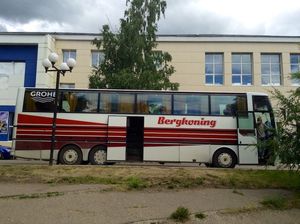
The bus, AKA “Meatball Express”
The bus that was to become so familiar in the coming days was a Euro-style travel coach of Belgian make, proudly emblazoned with “MuzEnergo Tour” in Cyrillic script on the signboard above the windshield. It was perfectly comfortable (and, crucially, climate-controlled) inside, apart from the fact that every spare centimeter was crammed with instruments, other music gear, and personal effects. (Larger items went in the cargo bays below.) The bus was impressively piloted for many thousands of often challenging kilometers by our two superhuman drivers, Sergey and Alexander, who spelled each other at intervals and performed miraculous repairs on more than a few occasions. Rounding out the crew were Iouri’s indispensable assistant Daria Nikitskaya, who provided translation and other support for our uppity assemblage of foreign devils with the patience of Job; sound man Wadim; tour videographer Anton and photographer Aleksey Akimov; and all-purpose roadie Dimi – a very cheerful and easygoing crew to be sure. We seldom overnighted on the bus, except where the protracted Siberian distances made it necessary, but usually stayed in so-called rural “resorts,” shabby guesthouses, and grim former state hotels. To describe our lodgings as funky would be a supreme understatement, with their broken fixtures, malodorous commodes, and hardtack mattresses, but I mean no offense whatsoever and am in fact amazed at Iouri’s ability to conjure up accommodations for our party of 30-plus mostly foreign lodgers in locales far from the beaten tourist track. So far, indeed, that one of my wife Anne’s Russian English students, when told of my itinerary, responded that “the farther east you go in Russia, the more you travel back in time into the Soviet Union.”
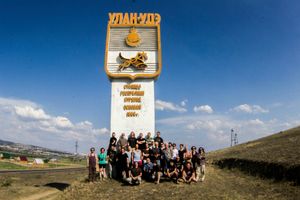
MuzEnergo Tour 2014 reaches its easternmost extremity, Ulan Ude (photo: Alexey Akimov)
Next up, and my first actual gig of the tour, was the Voice of Nomads Festival in Ulan Ude, the hub of Russia’s Buryat Republic, an ethnically Mongolian region bordering Mongolia to the south. An hour or so before reaching Ulan Ude, it became apparent that we were transitioning into a different sort of landscape than the endless taiga forests that cloak much of Siberia’s vastness. Here we were greeted by vistas of expansive, rolling grasslands spreading to the far horizon, punctuated here and there by swatches of forest and roofed with a brilliant cerulean sky – the very definition of horse country. Ulan Ude was the easternmost point reached by the 2014 MuzEnergo Tour, a milestone we celebrated with a group photo at a monument marking the city boundary.
Voice of Nomads took place on a large outdoor stage in the gorgeous setting of the Ethnographical Museum of the Trans-Baikalian Peoples, which boasted numerous full-scale replicas of traditional buildings ranging from a bark tepee of the forest-dwelling Evenks to a massively timbered church in the style of the Russian Old Believers, trimmed with the filigreed woodwork for which Siberia is famed. Craftspeople and food vendors had set up booths throughout the grounds, and the day’s pleasantly dry air and golden light made for idyllic surroundings.
As usual, our sound check alone took hours – with so many musicians, we typically broke down into seven or eight discrete groups, some of them fixed, others loose transitory collaborations. With each group allotted a 25-minute set, this translated to roughly 3.5–4 hours of continuous musical performances. That much music would normally exhaust even the hardiest listeners back in our home countries, but almost everywhere we performed, the Russian audiences took it all in stride and remained focused and enthusiastic for the duration – truly a dream gig for those of us who hailed from more attention-challenged societies. Another revelation was the number of women in the audience at all the concerts we played, usually comprising far more than half the attendees. This was truly a reversal of the normal order for musicians accustomed to playing mostly for men in such stereotypically male-dominated scenes as free jazz and progressive rock, and was wonderfully refreshing. When I mentioned this to an Embassy staff member after the tour, she replied, “More women than men at events is always the case here…. Well, if you go to a football game, you will see few women, but at all cultural events, women are a majority.” Intriguing food for speculation to be sure.

Wadim Dicke at Voice of Nomads Festival, Ulan Ude
For all its isolation, Voice of Nomads was an impressively well-run festival and included a number of relatively well-known acts from Russia, Europe, China, and even Africa. The festival generously gave over an entire day to us (with a Buryat rock band opening), with the MuzEnergo extravaganza running a full 5-6 hours. It was a big leap of faith for the festival organizers, who had no idea what kind of music to expect from MuzEnergo – Iouri generally thought it best to lump it all under the shorthand of “jazz” – at an event that was decidedly shaded toward world-music fusion tinged with New Age trappings. The audience was a revelation, equal parts “European” Russians and Asiatic Buryats, and to my surprise and delight, I saw many of the two mixing freely as friends, a stark contrast to my experiences in China in the late 1980s, when ethnic minorities were generally shunned by the Han majority. Colorful garments in the native Mongolian style were on display, alongside brightly dyed hair and hippie garb, a couple of young gals made up as zombies, and a jolly lama in luminous yellow Buddhist robes who persistently bummed cigarettes off the musicians. Once nearly stamped out by the Soviets, Buddhism in the Tibetan lineage had recently made a remarkable comeback in Siberia, particularly here in Buryatia where brilliantly-hued new temples were springing up left and right.

Zombie gals, Voice of Nomads Festival, Ulan Ude (Photo: Aleksey Akimov)
I readied for my first MuzEnergo performance with some trepidation after having witnessed the striking virtuosity of the previous acts. Here in the moment, my cavalier decision to just show up and improvise began to seem overconfident, but I was buoyed by the fact that I had some very accomplished and simpatico collaborators; by this time Yuri, Wadim, and I had recruited the singular drummer Vasco Trilla from Barcelona. In addition to my guitar, for variety I had brought along a small kalimba (thumb piano) that I regularly processed through effects with my group Tempered Steel back in Seattle. My idea was to begin our collective improvisation using this instrument, then switch to guitar and gradually build in intensity, bouncing ideas off the other players in real time. Yet while the plan was sound in theory, I hadn’t bargained on getting derailed by technical issues. As the sole non-European player present, I was the only one who needed a foreign DC converter (220 volts to U.S.–standard 110) to power my devices. I had brought the converter and an array of foreign plug adapters, but never anticipated the difficulty of actually plugging the thing into the awkward recessed outlets that seemed to be the norm in Russia. Consequently I lost power altogether five times during my inaugural MuzEnergo performance as the plug repeatedly tipped out of the outlet of its own weight. (I soon learned to place the whole contraption upside-down, or wrapped about with tape, for all subsequent gigs.) As if that weren’t enough, I had gotten the settings badly wrong on the unfamiliar borrowed amplifier, with the result that I was playing at about three times the desired volume and could barely hear what my mates were doing. I left the stage much chagrined about this anticlimactic first set, but was comforted by some of the other musicians who told me they’d genuinely enjoyed what we were doing. Nevertheless, a valuable lesson learned.
After the marathon concert wrapped up, our supremely gracious hosts treated us to a sprawling banquet in our honor, with a long central table straining beneath the weight of voluminous dishes of pelmeni (Siberian ravioli), steamed dumplings, assorted meats and vegetables, and copious amounts of wine and, of course, vodka. Milling around the table, I recognized the young Buryat rock band who’d preceded us on stage, whom I’d found surprisingly interesting musically, at one point even suggesting the influence of King Crimson. I approached and complimented them on their set, but all they wanted to talk about was how astounding, and completely unexpected, they’d found MuzEnergo to be. “You have to understand,” the main guitarist told me, “that this sort of thing doesn’t happen – never happens –around here.” He went on to explain that Buryats like him were tired of being typecast as traditional Mongolian khoomei (throat, or overtone) singers. “We’re connected to the wider world via the Internet, and listen to bands like King Crimson.” (A-ha! When I told him that I’d played with a couple of members of Crimson, he looked like he’d seen a ghost.) It was at this point that I truly realized the importance and impact of MuzEnergo, and understood why Iouri went to such arduous lengths to make the tours happen. As in the opening passage of this article, it seemed to me that the most apt metaphor for MuzEnergo was an alien spaceship landing unannounced in a remote and unlikely locale, disgorging outlandish beings bearing strange coded messages in an utterly novel musical language. The festival director essentially acknowledged the same, thanking us profusely for giving the Voice of Nomads audience a fascinating and wholly unexpected glimpse into hitherto uncharted musical worlds, and remarking on the “seriousness” of the music. After much glad-handing and rounds of toasts, we ended this memorable day and headed back to our hotel – a onetime railroad workers’ “sanitarium” – for a 5 A.M. wake-up call and tomorrow’s all-day bus ride.
Far too early the next morning, we grumpily filed back onto the bus in the pearly pre-dawn light for the return journey to Lake Baikal, where we’d be spending a rare off-day at a modest lakeside resort on the southeastern shore. Having reached its ultima Thule in Ulan Ude, the bus was now heading back westward for the first time since setting out from Moscow weeks earlier. After hours of being jackhammered around in our seats on Russia’s principal cross-country highway, long stretches of which were seemingly under permanent construction, we reached the appealing chalet-style resort in the early afternoon. It was an especially welcome respite for our hard-working drivers and crew, who spent a relaxed afternoon swimming in the lake and basking beneath the warm midsummer sun. The rest of us kicked back, traded musical war stories, and enthused about shared musical interests. I was really starting to bond with these guys. I’d only been in Russia for four days, yet it already seemed like a month. (I’ve often observed how time seems to stretch when one travels, what the Indonesians refer to as “rubber time.”)
In the wake of my group’s disappointing improvised set in Ulan Ude, I opted to take a completely different approach and build a set around some of my compositions, specifically some pieces influenced by traditional Chinese music, an interest I’d developed while living in China and Taiwan in the late 1980s and early ‘90s[1]. The “busman’s holiday” gave us a much–needed opportunity to actually learn and practice the material before taking it on stage. From here on these tunes, with some semi-structured linking passages and a short piece contributed by Wadim, would form the basis of our set. It was at this point that the incredible Catalan hurdy-gurdy player Marc Egea joined our ensemble, enriching our material with sonorous drones and filigreed melodic figures.
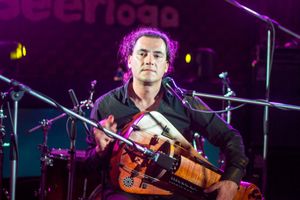
Hurdy-gurdy virtuoso Marc Egea (Photo: Aleksey Akimov)
The following day we rounded the southern tip of the lake, crossed the broad Angara River that drains Baikal to the northwest, and checked in at our hotel for the next two nights – a once grand, now sadly faded edifice perched on a bluff above the pleasant lakeside resort village of Listvianka. After settling in, the tour party was summoned to the usual disappointing, commissary-style meal in a large, empty dining hall, but I left most of the indifferent fare untouched and slipped away with Dario to investigate the restaurants we’d seen lining the shore below. We hit the jackpot at an agreeable eatery where we spent a couple of pleasant hours sampling several varieties of Lake Baikal’s signature dish, a delicious landlocked salmonid species known as omul.
A word about the tour food in general: Iouri had promised to provide us with three daily meals and accommodations for the length of our stay in Russia. While he never failed to deliver on his pledge, the expense of feeding three dozen people meant that we typically subsisted on rather humble and monotonous fare, partly a consequence of the local Siberian geography, where a fleetingly short growing season and acidic soil yielded mostly hardy root vegetables such as potatoes, turnips, and carrots. Pelmeni, a sort of Siberian meat-filled ravioli, was available at most of our stops, as were the ubiquitous nondescript meatballs that led one member of our party to dub us the “Meatball Warriors.” As one of the extremely rare souls who have a pronounced aversion to onions, I quickly discovered to my dismay that the pungent bulbs are a prominent ingredient in virtually every Russian dish, but at least I fared better than the strict vegan Beat Gisler. Fortunately, we were able to periodically restock our personal food stashes at a number of excellent supermarkets en route.
Our next gig was one of a pair of shows at sister “Beer Loga” (“Bear Den”) jazz clubs in the cities of Angarsk and Irkutsk. Initial impressions of Angarsk from the bus windows were not encouraging – with its belching smokestacks, maze of petro pipelines, and dismal aura of grit and decay, the city seemed the very embodiment of midcentury Soviet industrial blight. It therefore came as a surprise to find such a capacious, well-appointed jazz club in its midst. (Most U.S. cities would be envious.) I again looked on amazed as a good-sized crowd of evidently sophisticated listeners took in nearly four hours of our uncommonly varied and challenging music; the same was true of our show in Irkutsk the following night. Again, women made up the majority of the audiences.
We left Irkutsk directly after the gig on an overnight bus journey to the small city of Kansk, where we were scheduled to play a concert at the municipal theater. Pitching and rolling in our seats for half a day on the badly corrugated highway left us feeling rather out of sorts when we tumbled out of the bus that afternoon in seedy Kansk, a regional administrative center in the sprawling Krasnoyarsk Krai (district). This burg made Angarsk look like Monte Carlo, with its weedy public square filled with the homeless and destitute and a strangely disconsolate-looking bust of Lenin. The night’s gig had been hastily arranged by Iouri just a day or two earlier, and the resultant lack of advance advertising had yielded just seven tickets sold. The officials who ran the theater actually tried to talk us into canceling the concert altogether – truthfully, most of us musicians would have preferred that, too, given the circumstances – but a persistent Iouri managed to salvage the booking. In the end, perhaps 30 people showed up for the gig in a theater that held hundreds – the one poorly attended gig on my leg of the tour. But one couldn’t have asked for a more attentive, patient, and enthusiastic audience. I was especially pleased with my group’s closing set, after which a little old babushka lady rose to her feet with lusty shouts of “Bravo!” – instantly dissolving all the trials and frustrations of the road. Connecting with people like this across yawning cultural divides is truly what it’s all about in the end.
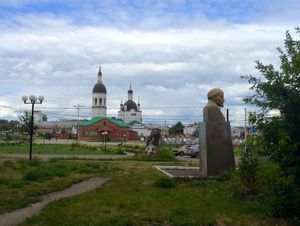
Disconsolate Lenin, Kansk
Fortified with late-night pizza and beer, we set off around midnight for our next destination, the rural agricultural township of Dzerzhinskoye, where we were to play the inaugural “Iron Felix” Festival. Now we were getting way off the beaten path, as exemplified by our primitive accommodations. We arrived in the middle of the night at a long wooden building that seemed more like a gulag than a guesthouse and were assigned to Spartan rooms furnished with military-style plywood beds thinly cushioned with inch-thick mattresses. The rustic guesthouse was served by a pair of outhouses that were like the very gates of Hell, reached via a treacherous, slippery plank walkway. The single shower was filled knee-deep with murky water by the time 20-some people had bathed. And as was typically – and probably deliberately – the case, the guesthouse was situated in an isolated locale beyond walking distance from any place of interest. Iouri later admitted that his strategy had been to force us to live together in close quarters to promote family-style camaraderie and collaboration, rather than allow us to scatter and form cliques. It was also no doubt a wise decision not to set loose a bunch of foreign nationals in rural Russia, where our presence might have been treated with suspicion.
We awoke the next morning to torrential rain tattooing the guesthouse roof and cascading off the eaves. Even a quick dash to the outhouse would turn you into a sponge. The soggy weather system seemed to have settled in for the long haul, putting us in no mood to play this open-air festival the next day. Our disposition didn’t improve when we drove out to inspect the venue in a heavy downpour, the bus threading its way around muddy craters on the dirt road leading to the festival site, a meadow surrounded by woodland. A small covered stage in the center of the field offered no real protection against the hammering rain, and rebellious thoughts began to fester as we huddled beneath a compact grandstand eating cups of porridge ladled out of a trailer. No way were we going to play in these conditions; we’d just stay put in the miserable guesthouse and drink beer instead.

Not a promising start to the Iron Felix Festival…
Presently our gracious hosts brought us to the township’s new art museum, a source of great pride to the locals, and filled with a surprisingly impressive collection of works by regional artists. It gradually became clear that the people of Dzerzhinskoye had invested high hopes in both the art museum and their new music festival in a bid to attract interest and investment to their neglected district. It was a big deal to them to have accomplished foreign musicians travel so far out of their way to perform at their festival; realizing this quelled our mutinous thoughts.
After a long afternoon and evening cooped up in the sodden guesthouse, we arose in the morning to find the rain mercifully giving way to glorious weather, restoring our spirits and desire to play. We drove back out to the now bucolic meadow, where the second day of the Iron Felix Festival was getting underway. (Some poor rock bands had actually performed for a handful of hardy souls during the previous day’s downpour.) The festival, and the township itself, were named after “Iron Felix” Dzerzhinsky, a prominent official in early Soviet times who’d left a decidedly mixed legacy, as both the head of the sinister security apparatus that preceded the KGB, and as a generous benefactor for orphaned youths. A controversial figure to this day, he seemed to remain popular among the people of this locality.
The MuzEnergo musicians filled the sunny afternoon with our usual perplexing blend of instrumental adventurism, perhaps not what the rock-oriented audience was expecting, but well received just the same. Afterwards we discovered that the bus had suffered a major malfunction that day, and watched in dismay as Sergey and Alexander crawled beneath its undercarriage in a valiant effort to repair a problem with an axle. The rest of us were ferried back to the wretched guesthouse by volunteers, despondent at the prospect of spending another night there, but to our great jubilation the bus arrived, repaired, a couple of hours later. Before setting out for our next stop, Krasnoyarsk, we attended a lavish banquet in our honor at the town hall, hosted by district officials who plied us with vodka toasts to international friendship and cooperation. At one point the district chief actually implored us to encourage businesspeople in our home countries to invest in Dzerzhinskoye (as though avant-garde musicians like ourselves had any such lofty connections). Toward the end of the meal I rose and toasted our hosts in gratitude for their truly gracious hospitality, to which the district chief replied, “This man is a true Russian” – !

Iron Felix Festival in more salubrious weather
We arrived in Krasnoyarsk in the wee hours of the morning and toppled wearily into our beds in the hotel. A large city on the banks of the mighty Yenisey River that descends from mysterious Tuva in the Central Asian highlands to the south, Krasnoyarsk was a pleasant municipality of broad, tree-lined streets, handsome buildings, and smartly accoutered shops. The city was strikingly cosmopolitan compared to our other stops in Siberia; I was even able to enjoy an espresso that would have done a Seattle barista proud.

Audience, State Philharmonic Hall, Krasnoyarsk (photo by (Photo: Aleksey Akimov)
We were all greatly looking forward to that evening’s concert in the grand State Philharmonic Hall, the largest, most opulent venue we played on my leg of the tour. The sold-out concert did not disappoint, as each act delivered one of its strongest sets to rapturous applause – one excited onlooker told me that it was the event of the year in the city. I was certainly very happy with my own group’s set, likely the best of the tour and a tantalizing indication of how the group might have developed had we been able to continue our collaboration, but sadly, Wadim and Yuri now had to take leave of the tour to return to their nearby hometown of Tomsk, while the rest of us readied for tomorrow’s flight back to Moscow and the final shows of the tour. But before we parted ways, the entire MuzEnergo cast had a chance to perform together in a memorable mass improvisation conducted by Marc Egea as the finale of the Krasnoyarsk concert.
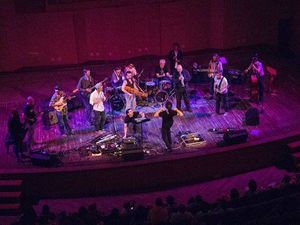
Mass conduction with all MuzEnergo participants, Krasnoyarsk State Philharmonic Hall
By the following afternoon the remaining tour participants were all back in Moscow. (Alexander and Sergey would drive the bus the remaining several thousand kilometers back from Krasnoyarsk.) That night we would wrap up MuzEnergo at one of Moscow’s leading jazz venues, the Alexei Koslov Jazz Club, where in the absence of Wadim and Yuri I would play an exhilarating duo improvisation with the great drummer Bruno Tocanne. Crawling across impossible city traffic in an airport taxi, I reflected on the marvelous, life-changing events of the previous weeks, bone-weary but extremely grateful for the remarkable opportunity to perform my music in such improbable places, with such formidable musicians, and forge what are certain to be lifelong friendships as a result. Most of all, it was the warm reactions of Russian listeners to our alien music that I’ll remember with the greatest pleasure. Born and raised a child of the Cold War, I’d seen more clearly than ever how music and friendship – simple human contact – make a mockery of all our overheated political posturing.
When offered a chance to return for the next year’s tour, I accepted without a moment’s hesitation.
With heartfelt thanks to Iouri Lnogradski, Leonardo Pavkovic, Maria Shustina, Natalye Buylina, Mary Ellen Koenig, Mathew Hangengruber, the United States Department of State, the U.S.–Russia Bilateral Presidential Commission, Daria Nikitskaya, Boris Savoldelli, and all of the MuzEnergo musicians and crew.
© 2015 Dennis Rea
[1] Described in my book Live at the Forbidden City: Musical Encounters in China & Taiwan (Blue Ear Books, 2015)
